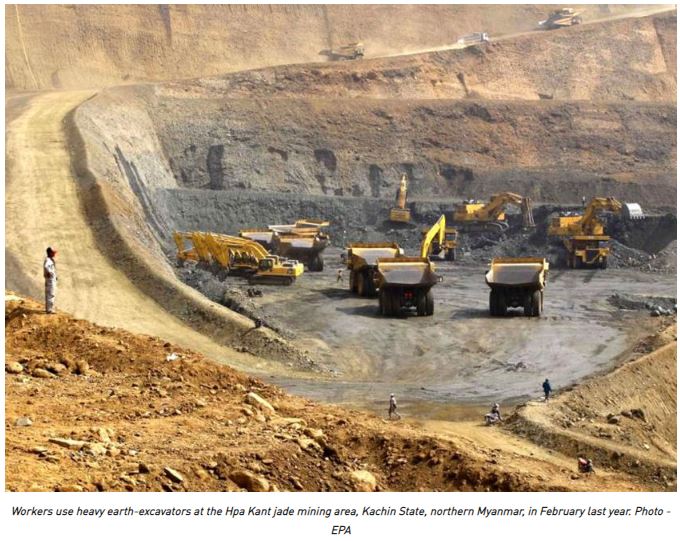Myanmar: Reform of extractive state businesses delayed
The reform of Myanmar’s opaque and powerful state-owned enterprises (SOE) has been delayed for over a year due to sensitivity surrounding the industries.
A public debate in Mandalay to reform Myanmar’s state-owned enterprises engaged in the extractive sectors was held under the work programme of Myanmar Extraction Industries Transparency Initiative (EITI), according to Department of Mining Deputy Director General U Kyaw Thet.
“It aims to implement reforms in SOEs engaging in mineral resources extraction. There are partnerships with SOEs in our country but they are just playing regulator role, not business role, and we will review it,” he said during a public talk organised by EITI for the release of its second and third reports on January 11.
Only SOEs related to oil and gas, jade and other precious stones and other mineral extraction sectors are included in the event.
EITI’s reports provided information about the audit of tax revenue and other non-tax revenue produced from the country’s mineral resources sector in the fiscal year of 2014-15 and the fiscal year of 2015-16. The fourth report for the fiscal year of 2016-17 will be released at the end of March 2019.
EITI coordinator U Soe Win said the group wanted to carry out SOE reform a year ago, but details were difficult to implement owing to the sensitivity of the industries.
According to the report summary, Myanmar oversees the oil and gas sector via Myanma Oil and Gas Enterprise (MOGE) by production sharing contracts.
Currently, SOEs receive funding from the state. After cutting costs, 45 percent of the net profit will be paid to the state. Profit-making SOEs, meanwhile, can keep profits in the so-called “Other Accounts”. Money in these accounts will not accumulate interests for the SOEs.
“In regard to SOEs, standards from other countries, including China, one of our neighbours, have been studied. We won’t copy directly.
“We’ll implement that which is compatible with us. Foreign experts will also be included,” Daw Moe Moe Tun, central committee member of EITI trilateral coalition, told The Myanmar Times.
EITI has ensured the processes of transparency and responsibility for better management.
“MOGE has the highest revenue. So, we focus more on reforming it. Among the SOEs, though gem enterprise damages the environmental the most, its income is scant,” she said.
“We point out that the income is lower than the income of garment factories. If they operate systematically, they can earn much more in terms of income,” said Daw Moe Moe Tun, representative for a civil society organisation.
Nearly US$1.2 billion was separated as a reserve fund for MOGE in 2014-2015 and the five raw materials manufacturing industries placed $1.3 billion in their “SOE other accounts” in the same year.
Like the oil and gas sector, state-owned enterprises in the mining sector are the main receivers of taxes from mining contracts. According to the lists from 2015-2016, the state-owned enterprises such as raw material manufacturing industries which are affiliated to the Ministry of Natural Resources and Environmental Conservation put nearly US$105.95 million (K129.6 billion) in their Other Account.
“The income from Other Accounts is more than half of the revenue from the extractives industries. This is an issue. According to the lists of World Bank, 30pc of the population of Myanmar are poor.
“The government and the entrepreneurs think that we are exaggerating on these things. In reality, we carry out in accordance with the standards,” she said.
Myanmar became an EITI member country in 2014 and is now going through its first round of validation process against the EITI Standard 2016, the objectives are clear: shape transparency, practice mindful governance via policy reform and legitimate tax information to an industry that has contributed significantly to the government’s budget.
The validation result will come out in mid 2019 after the release of three reports which address the issues of tax management in the gemstone and oil and gas sectors.
Source: https://www.mmtimes.com/news/reform-extractive-state-businesses-delayed.html


 English
English




